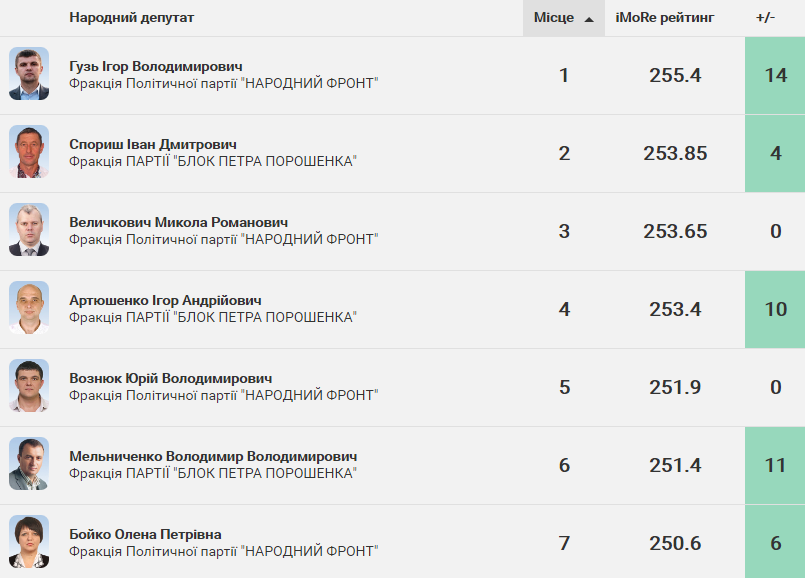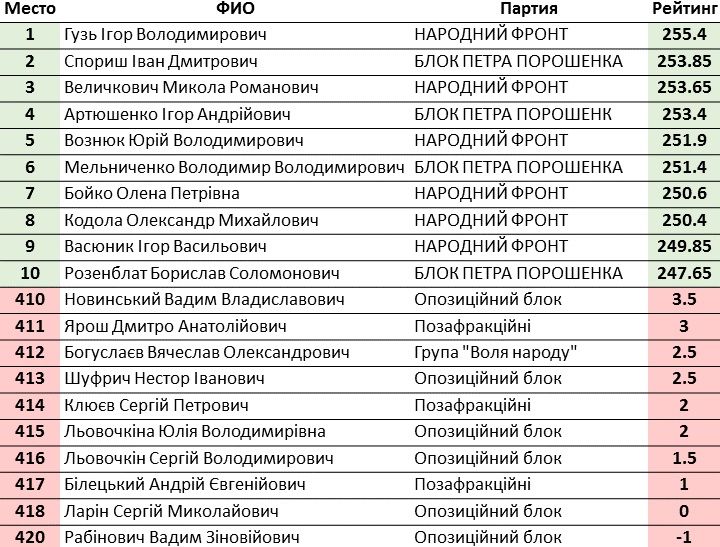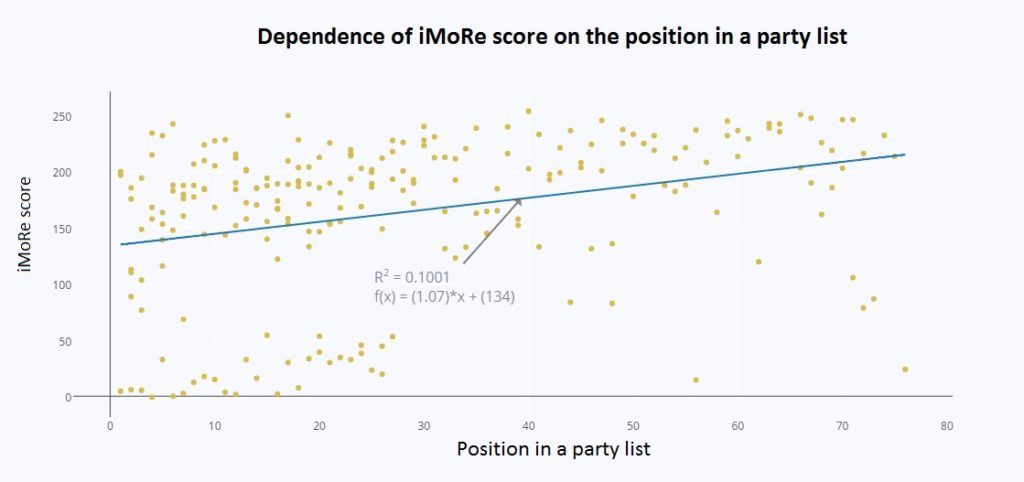Who are the most progressive legislators, i. e. who votes best for reformist laws? What does their efficiency depend on? Those are not rhetoric questions. VoxUkraine has analyzed votes by all the MPs of the current Parliament and found 10 factors that define the MP’s efficiency. For instance, female and young, unexperienced MPs vote better for progressive laws than male MPs of senior age. The ideal MP in 2016 has had the following traits: female, less than 34 years old, a former journalist, from Bukovina, and a People’s Front member.
At the beginning of 2016, VoxUkraine constructed the ranking of reformist MPs of the current Ukrainian parliament, based on the Reform Index. We analyzed the votes of all the MPs for 90 laws that were defined as the most reformist and ranked depending on their importance. The resulting score of every MPs depended on how he voted for reformist laws.
Three months later, we have updated our ranking. We added almost 50 important laws. We analyzed those factors that define the reformist efficiency of MPs in Ukraine. In constructing this ranking, 139 key vote in almost 1.5 years were taken into account.
We have only used open sources: Reform Index, DataVox, OpenRada. Follow this link, if you want to learn more about the Reform Index methodology.
Fact 1: Vadim Rabinovich is the only MP with a negative score
There have been considerable changes in the top-10 of the general ranking. Five new MPs joined the top-10: Ihor Guz (People’s Front, +14), Ihor Artiushenko (PETRO POROSHENKO BLOC, +10), Volodymyr Melnychenko (PETRO POROSHENKO BLOC, +11), Olena Boyko (People’s Front, +6), Oleksandr Kodola (People’s Front, +15).
Ihor Mosiychuk (Radical Party, 138) and his colleague Ihor Popov demonstrated the biggest fall in the ranking (-121).
Reform Index ranking of reformist MPs (to sort, click the column’s title)

As expected, Opposition Bloc’s MPs were the least efficient in voting for reformist laws. The only MP with a negative Reform Index score is Vadim Rabinovich (-1), the fourth in the Opposition Bloc party list.
The first and last 10 MPs in the reformist ranking (Nadia Savchenko ranks 419 with 0 ranking)

Fact 2. Women vote better for reformist laws
Female MPs are more reform-minded. For instance, the average score of female MPs equals 169, while the same indicator for 369 male MPs is equal to 149. The least efficient female MP is Yulia Liovochkina (2, Opposition Bloc); the most efficient female MP is Olena Boyko (250.6, People’s Front).

Fact 3. MPs’ efficiency is hindered by experience. Unexperienced legislators are more efficient
Are more experienced MPs more efficient, given that they know the system? Or are new MPs that are not integrated in the system more reform-minded?
The answer is unequivocal. Unexperienced MPs beat more experienced colleagues by 50 points on average in the ranking. This is yet another argument in favor of bringing new people into the parliament.

Fact 4. Age is a problem
It is obvious that older MPs vote worse: Yukhym Zvyahilsky (83 years old) scored 9.25, Viacheslav Boguslaiev (78 years old, scored 2.5), Yuliy Joffe (75 years old, 21.25).
Yet senior age is not an obstacle. Some veteran MPs ranked in the first hundred: Serhii Draiuk (People’s Front, 246.1), Andrii Reka (People’s Front, 240.65), Mykhaylo Dovbenko (PETRO POROSHENKO BLOC, 226.6), Mykola Fedoruk (People’s Front, 221.4), Mykola Lavryk (PETRO POROSHENKO BLOC, 219.55), Oleksandr Romanovskyi (People’s Front, 215.95).
The most efficient age (in terms of voting for reformist laws) lies in the range of 28-34 years (the average score is 200).

Fact 5. Former businesspersons are better MPs than experienced legislators are. Journalists are even better
One third of the incumbent MPs worked in the 7th convocation of the Parliament. It can be assumed that they are more experienced, understand the lawmaking process better and understand what reforms the country needs. Yet numbers prove the opposite. Among all profession groups (professions at the time of election), experienced MPs vote in the least efficient way (average Reform Index score is 120). For instance, former businessmen voted much better (they scored 173 on average). Former journalists and MPs’ assistants vote even better. Yet there are just four journalists in the parliament, Olga Chervakova (237, PETRO POROSHENKO BLOC), Serhii Vysotsky (236, People’s Front), Serhii Leshchenko (189, PETRO POROSHENKO BLOC), Mustafa Nayyem (146, PETRO POROSHENKO BLOC).

Fact 6. “Majoritarian” MPs are less efficient
Those MPs that were elected through party lists are on average 30 points more efficient. The reason is obvious. It is the lack of party discipline and control. Parties can make proportionally elected MPs vote along the party lines (the imperative mandate makes them very vulnerable). However, the link of majoritarian MPs to their districts is very formal. Voters do not have much influence on how their MPs vote. One of the ways to solve this problem is to reform the election system: open lists and no majoritarian districts could be a more efficient system.

Fact 7. The most reform-minded majoritarian MPs come from Chernivtsi
Majoritarian MPs from Chernivtsi Region are the most reformist in Ukraine. The average score of four MPs from the region is 230. Vinnytsia ranks second (eight MPs, 216 points on average). Zhytomyr ranks thirds (6 MPs, 209).
The least efficient majoritarian MPs come from Kharkiv Oblast (14 MPs, 52), Luhansk Oblast (5 MPs, 61), Donetsk Oblast (12 MPs, 61). Oleksandr Kirsh stands out from the rest of majoritarian MPs from eastern regions (PETRO POROSHENKO BLOC, 240.65).

Fact 8. Top MPs on the party lists are inefficient
Are those MPs that lead party lists more efficient in voting for reformist laws? The brief answer is no. The degree of correlation between the Reform Index ranking and the position in a party list is insignificant (R2 = 0.1). The results of top MPs are very different:
- Yuriy Lutsenko (№2 in the PPB list) ranks 190.
- Hanna Hopko (former Samopomich leader) ranks 153; Semen Semenchenko’s position is 319.
- The prime radical of Ukraine Oleh Lyashko ranks 143;
- Yulia Tymoshenko, Batkivshchyna’s leader, ranks 300;
- The Opposition Bloc’s leaders Yuriy Boyko and Oleksandr Vilkul rank 409 and 405 correspondingly.

Fact 9. The Radical Party is distancing itself from reforms
The biggest decline in the ranking was demonstrated by Oleh Liashko’s Radical Party MPs (on average lost 42 positions). It is the result of their decision to leave the coalition and join the opposition. The Radicals officially left the coalition on March 29, 2016. Two other coalition members, Batkivshchyna and Samopomich, have also lost their positions in the rankings, but to a smaller extent (10.5 and 3 positions). This also results from their decision to leave the coalition and stop supporting the coalition’s laws.

Fact 10. People’s Front leads the reformers
As in the first edition, The People’s Front tops the list of reformers. Moreover, Arseniy Yatsenyuk’s faction has increased its lead over Petro Poroshenko Bloc by 20 points (from 5 to 25).

Attention
The author doesn`t work for, consult to, own shares in or receive funding from any company or organization that would benefit from this article, and have no relevant affiliations



